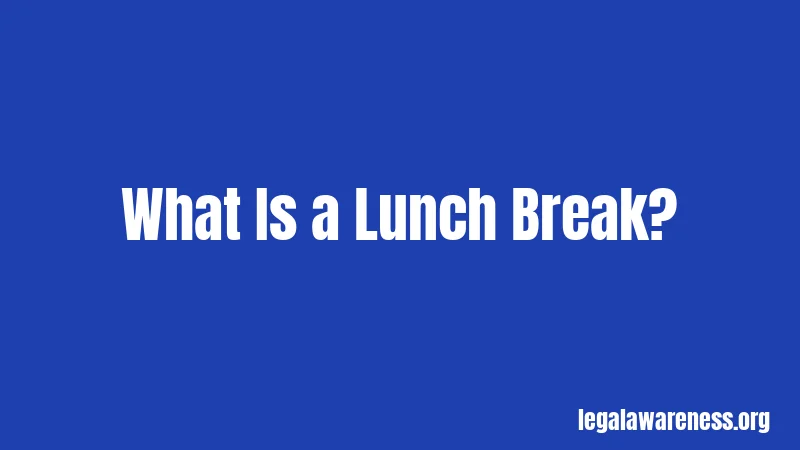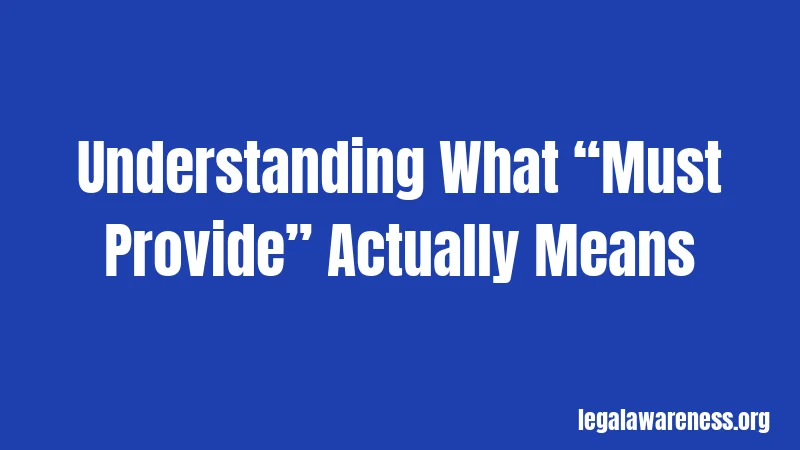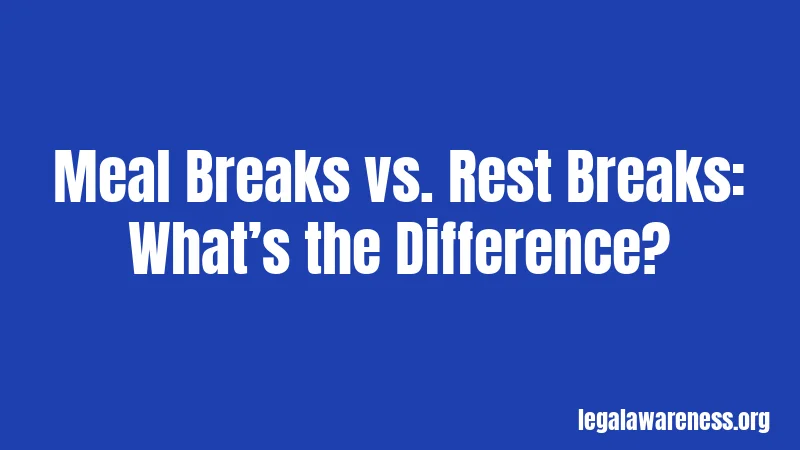Ohio Lunch Break Laws (2026): What You Actually Need to Know
Most people have no idea how strict—or surprisingly loose—Ohio’s lunch break laws actually are. Seriously. You might think there’s one big rule. But the truth? It’s way more complicated than that. Let’s break down exactly what applies to you and your job.
Here’s the thing: if you work in Ohio, you need to know these rules. Your boss needs to know them too. Getting this wrong can lead to real consequences for both of you. So let’s talk about what’s actually required.
What Is a Lunch Break?

A lunch break is time off during your work day. You can eat, rest, or do whatever you want during this time. It’s unpaid time in most cases. Think of it like a pause button on your work shift. Your employer isn’t paying you, but they also can’t make you work.
Pretty straightforward, right? But here’s where Ohio gets interesting. The state doesn’t have one simple rule about lunch breaks. Instead, rules depend on your age, industry, and specific job. Confused about which rules apply to you? Stick with me. We’ll sort it out.
Ohio’s Basic Lunch Break Rules
The Main Rule (Or Lack Thereof)
Okay, pause. This is important. Ohio doesn’t require most employers to give you a lunch break at all. Yep, you read that right. If you’re an adult working a regular job, there’s no state law saying your boss must give you unpaid break time.
Does that surprise you? You’re not alone. This confuses a lot of people. Many states have much stricter rules. But Ohio? They basically leave it up to your employer. That’s why your employment contract or employee handbook is so important. Those documents spell out whether you get a break and how long it is.
But wait, there’s more to know. Just because Ohio doesn’t require lunch breaks doesn’t mean employers can do whatever they want. Other laws still apply. And certain workers get special protections.
When Your Employer MUST Give You a Break
Let’s talk about the situations where Ohio actually does require a break. This is where the rules get specific. Here’s what you need to know.
Minor workers get real protections. If you’re under 18, your employer must give you different rules. Any minor working 4 or more consecutive hours must get a 30-minute break. That’s the law. Your boss can’t skip this one.
Also, that break has to be unpaid. Your employer doesn’t have to pay you for that time. The important thing is you have to get it. The break must be uninterrupted too. Your boss can’t make you work during your break time.
Nursing mothers receive legal protections under federal law that Ohio honors. If you’re breastfeeding, your employer must give you break time. You also get a private space to pump. This applies to employers with 50 or more employees. It’s basically a federal rule, but Ohio follows it.
Farm workers sometimes fall under different rules. If you work in agriculture in Ohio, certain protections apply. But this gets complicated fast. Farm work is regulated differently than most jobs.
Understanding What “Must Provide” Actually Means

Not sure what counts as a violation? Let me clarify. When we say your employer “must” give you a break, that means it’s legally required. Your boss can’t avoid it. They can’t say “no” or “not today.”
But here’s the honest truth: enforcement is loose. Ohio doesn’t have a ton of inspectors checking on this stuff. That doesn’t mean it’s okay to break the law. It just means you need to know how to advocate for yourself. If your rights are violated, you need to speak up.
The state’s Department of Commerce handles most employment complaints. But they focus more on wage issues than break time. Still, it’s worth knowing where to report a problem.
State vs. Federal Laws
Here’s where it gets tricky. Sometimes federal law is stricter than Ohio law. When that happens, the stricter rule wins. You get the better protection. That’s how it works.
For example, federal wage laws apply in Ohio too. If a break is so short that you should be paid for it, federal rules might apply. Anything under 20 minutes usually needs to be paid. Many employers don’t realize this. But it’s a real rule.
Your employer has to follow whichever rule protects you more. That might be Ohio law or federal law. Either way, you win.
Meal Breaks vs. Rest Breaks: What’s the Difference?

Wondering if there’s a difference between a meal break and a rest break? Great question. There actually is, and it matters.
A meal break is longer time off. Usually 30 minutes to an hour. You’re expected to completely step away from work. You eat, relax, maybe take a walk. This time is unpaid. Your brain is off the clock.
A rest break is shorter. Usually 15 to 20 minutes. It might be a bathroom break or a quick stretch. You’re still at the workplace, but you’re not working. Federal law says rest breaks should be paid. Your employer is paying for your time, even though you’re not working.
This matters because federal wage laws treat them differently. Meal breaks are unpaid. Rest breaks should be paid. If your boss calls a 15-minute break a “meal break” to avoid paying you, that’s actually illegal under federal rules.
Sound complicated? It’s really not once you understand the basics. The key is knowing what you deserve.
Penalties and Consequences
So what happens if your employer breaks these rules? Let’s talk about the real consequences.
For violating minor worker rules, the penalties are serious. Your boss could face fines up to $500 per violation. If it happens repeatedly, fines can add up fast. They could also face civil suits from the young worker. Plus, the state can order back pay for unpaid breaks.
For violating federal nursing mother rules, penalties are even harsher. Federal violations can mean fines up to $150 per employee per day. That’s not a small number. Employers take federal rules seriously because the costs are real.
For wage and hour violations, if your break time should have been paid, you can sue for back wages. You might also get “liquidated damages,” which is basically a penalty on top of your lost pay. Many employment lawyers work on these cases for free. They get paid from your settlement or judgment.
Here’s the honest truth: if you’re a minor and your boss skips your break, that’s a serious violation. If you’re an adult working a normal job, enforcement is looser. But federal rules still apply. Don’t assume a violation is okay just because enforcement is loose.
Special Circumstances in Ohio
The Hospitality Industry
If you work in a restaurant, bar, or hotel, you’re in a unique situation. These jobs sometimes have different rules. Hospitality workers sometimes get breaks, sometimes don’t. It really depends on the specific business and your job duties.
Many hospitality employers do give breaks—they’re just not always required to. Some do it because they’re good employers. Others do it because their industry standard requires it to attract workers. Either way, if your contract or handbook says you get a break, that’s binding.
Warehouse and Retail Workers
Retail and warehouse jobs sometimes involve specific break policies. If you work at a big warehouse, your company probably has written break policies. Those policies become your contract. Your employer has to follow them.
I looked this up recently. The rules surprised me. Many warehouse companies are actually very strict about breaks. They track them carefully. Why? Because they want to avoid legal problems. They know employment lawyers look for break violations.
Truck Drivers and Transportation
If you drive for work in Ohio, federal rules apply to you. The Federal Motor Carrier Safety Administration has strict rules about rest breaks and meal breaks. These rules are stricter than most Ohio employment rules.
Truck drivers must get specific rest periods. These aren’t optional. They’re about safety and driver fatigue. Your employer must give you these breaks. If they don’t, both you and your boss could face federal violations.
What Employers Can and Cannot Do
Your boss has some freedom with break policies, but also some limits. Let’s be clear about what’s legal and what’s not.
Your employer CAN:
- Require you to stay on the premises during your break (in most cases)
- Set specific times for breaks
- Reduce your break time if business is slow (for adults without contracts)
- Require you to clock out during breaks
- Establish rules about break room conduct
Your employer CANNOT:
- Force you to work during unpaid break time
- Deny breaks to minors
- Deny paid break time and then deduct pay anyway
- Prevent you from using the bathroom during breaks
- Punish you for taking a legal break
The key word here is “legal.” Your boss can’t punish you for exercising rights the law gives you. That’s retaliation, and it’s illegal under Ohio law.
How to Protect Your Break Rights
Here’s what you actually need to do. Stay with me here.
First, get everything in writing. When you’re hired, ask about break policy. Get the employee handbook. Read it carefully. If your boss verbally promises breaks, get it in writing. Verbal promises don’t hold up in court.
Second, document everything. Keep a record of your breaks. Note the dates and times. If your boss consistently doesn’t give you breaks, write it down. This becomes evidence if you need it later.
Third, speak up respectfully. If your break is being denied, talk to your boss. Be professional. Explain the rule. Sometimes it’s an honest mistake. Sometimes your boss doesn’t know Ohio law either.
Fourth, escalate if needed. If your boss refuses to fix the problem, talk to HR. Put your complaint in writing. Send an email. Keep a copy. This creates a paper trail.
Fifth, know when to get a lawyer. If you’re losing significant wages or facing retaliation, talk to an employment lawyer. Many offer free consultations. Some work on contingency, meaning they only get paid if you win. You don’t have to pay upfront.
The state’s Department of Commerce accepts complaints too. But honest feedback? Lawyers are often more effective. They know how to build a case.
Recent Changes and Updates
Okay, here’s where things get interesting. Ohio’s laws haven’t changed dramatically in recent years, but some trends are worth noting.
More employers are voluntarily adopting break policies. Why? Because good break policies help with worker retention. Workers want reasonable breaks. Companies that provide them attract better employees.
Federal enforcement has increased recently. The Department of Labor is more active. They’re looking for wage violations, including break-time issues. If your employer has been skipping breaks, this is relevant.
Also, more states are passing stricter break laws. Ohio hasn’t caught up yet. But workers are increasingly aware of their rights. Don’t be surprised if Ohio tightens rules in the future.
Frequently Asked Questions
Do I get paid for my lunch break in Ohio? Not automatically. Most meal breaks are unpaid. But rest breaks (under 20 minutes) should be paid under federal law. And if your contract says breaks are paid, your boss must pay you.
Can my boss make me eat at my desk while working? Not really. If you’re working, you should be paid. If you’re on an unpaid break, your boss can require you to stay on the premises, but you shouldn’t have to work. Check your handbook for specific rules.
What if I don’t take my break? You can usually choose to skip a break. Your employer probably won’t force you. But be careful—federal law sometimes requires breaks for safety reasons. For certain jobs, breaks aren’t optional.
If I’m fired after complaining about breaks, what do I do? That’s retaliation, and it’s illegal. Document everything and contact an employment lawyer immediately. You likely have a case. Don’t wait to get legal help.
Does Ohio’s minimum wage law cover breaks? Minimum wage laws don’t directly address breaks. But wage laws say you must be paid for all time worked. If a break is so short you’re still working, it must be paid. The time add up.
What about salaried employees in Ohio? Salaried workers get some different protections. But they’re not automatically exempt from break rules. It depends on their specific job and salary level. Check your contract or ask HR to be sure.
Final Thoughts
Now you know the basics about Ohio lunch break laws. The big takeaway? Ohio doesn’t require most employers to give breaks, but there are important exceptions. Minors must get breaks. Federal rules protect nursing mothers. And all workers deserve to be paid for time they actually work.
Stay informed, stay safe, and when in doubt, ask HR or look up the specific rule. If your break rights are being violated, don’t wait. Document the issue and talk to an employment lawyer. Your time is valuable. Make sure you’re getting paid for it.
References
- Ohio Department of Commerce, Division of Wage and Hour – State employment law resources
- Ohio Revised Code Chapter 4109 – Employment Laws – Minor worker protections
- U.S. Department of Labor – Wage and Hour Division – Federal break and meal period rules
- FLSA Breaks and Meal Periods – Federal requirements for break time
- Ohio Attorney General – Worker Rights – State workplace protection information
- National Employment Lawyers Association – Finding employment lawyers in Ohio
